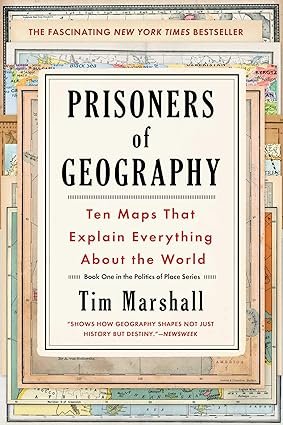Prisoners of Geography by Tim Marshall reveals the ways in which the physical world shapes political power, national interests, and global conflict. By examining regions such as Russia, China, the Middle East, and Africa, Marshall illustrates how natural features like mountains, rivers, and climate impact decision-making and national strategy. He argues that geography, more than ideology, often dictates political behavior and outcomes. With compelling case studies and clear, engaging analysis, Marshall’s work provides readers with a deeper understanding of why certain countries face specific challenges and how geography continues to shape global politics and relationships in the modern era.
Prisoners of Geography
₨599₨999
Marshall’s book explains how geographical factors have historically shaped nations’ political and economic strategies. By analyzing key regions and their impacts, he demonstrates how terrain, climate, and location have determined world power and conflict, offering insights into current global issues.
Related products
The End of India
₨899The End of India is a provocative and thought-provoking work by Khushwant Singh. In this book, Singh offers a candid and critical analysis of India’s socio-political landscape, focusing on issues such as communalism, corruption, religious extremism, and the fragmentation of the national identity. Singh reflects on the growing divisions within Indian society, both between communities and within the political system, and speculates on the consequences of these issues for the future of the nation. His writing is sharp, candid, and often controversial, offering a unique perspective on the challenges facing contemporary India.
₨1,190Where Wizards Stay Up Late The Origins of the Internet
₨899Where Wizards Stay Up Late details the creation of the Internet, focusing on the pioneers behind the groundbreaking technology. Katie Hafner recounts the challenges, discoveries, and collaborations that led to the development of the world-changing network.
₨1,299Lahore in the Time of the Raj
₨1,200This book explores Lahore’s transformation under British colonial rule, focusing on its urbanization, architecture, and the city’s social and cultural life. It examines both the British vision of Lahore as a colonial city and the experiences of its residents during this period. The book sheds light on the role of the city in the larger colonial context, with rich insights into its history, politics, and urban development.
₨1,500Towards People’s Histories In Pakistan
₨1,780After seventy-five years of independence, the history of Pakistan remains centered on the state, its ideology and the two-nation theory. Towards Peoples’ Histories in Pakistan seeks to shift that focus away from histories of an imagined nation, to the history of its people.
₨1,999The Men Who Ruled India
₨890The Men Who Ruled India is a compelling collection of biographical sketches of the British men who held the reins of power in India during the colonial period. Philip Mason examines the lives and legacies of figures such as Lord Curzon, Lord Lytton, and others who shaped the policies and events of British India. The book explores how these men navigated the complex political and social landscapes of the Indian subcontinent, often balancing imperial interests with local realities. Mason’s engaging narrative offers an insightful view of the personalities and decisions that defined British rule in India.
₨1,199Homo Deus A Brief History of Tomorrow
₨599Yuval Noah Harari’s Homo Deus explores humanity’s future, focusing on technological advancements, artificial intelligence, and biotechnology. The book raises profound questions about human purpose, ethics, and the challenges of navigating an era dominated by data and unprecedented capabilities.
₨1,200The Invention of Science: A New History of the Scientific Revolution
₨2,590A companion to such acclaimed works as The Age of Wonder, A Clockwork Universe, and Darwin’s Ghosts—a groundbreaking examination of the greatest event in history, the Scientific Revolution, and how it came to change the way we understand ourselves and our world.
₨3,545Islam: a Short History
₨1,910One of the world s foremost commentators on religious affairs on the history (and destiny) of the world s most misunderstood religion.
₨2,145









